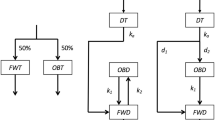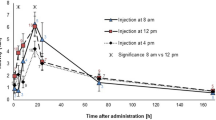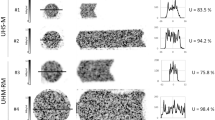Abstract
CARCINOGENIC studies with rats using ‘bone seeking’ radioactive isotopes have shown that if the isotope is administered in several doses at intervals from a few days to one month a larger number of bone tumours develop than for a single injection of the same quantity of isotope1,2. This increase in the number of tumours is due to an increase in the probability of tumours developing and also to a reduction in the mortality of the rats from other causes both before and after the time of appearance of the first tumour.
This is a preview of subscription content, access via your institution
Access options
Subscribe to this journal
Receive 51 print issues and online access
$199.00 per year
only $3.90 per issue
Buy this article
- Purchase on Springer Link
- Instant access to full article PDF
Prices may be subject to local taxes which are calculated during checkout
Similar content being viewed by others
References
Kusma, J. F., and Zander, G., Arch. Path., 63, 198 (1957).
Barnes, L. L., Sperling, G., McCay, C. M., and Brown, C. E., Arch. Path., 66, 529 (1958).
Author information
Authors and Affiliations
Rights and permissions
About this article
Cite this article
BLACKETT, N. An Effect of Dose Fractionation on the Incidence of Bone Tumours using Radioactive Phosphorus. Nature 184, 565–566 (1959). https://doi.org/10.1038/184565a0
Issue Date:
DOI: https://doi.org/10.1038/184565a0
Comments
By submitting a comment you agree to abide by our Terms and Community Guidelines. If you find something abusive or that does not comply with our terms or guidelines please flag it as inappropriate.



